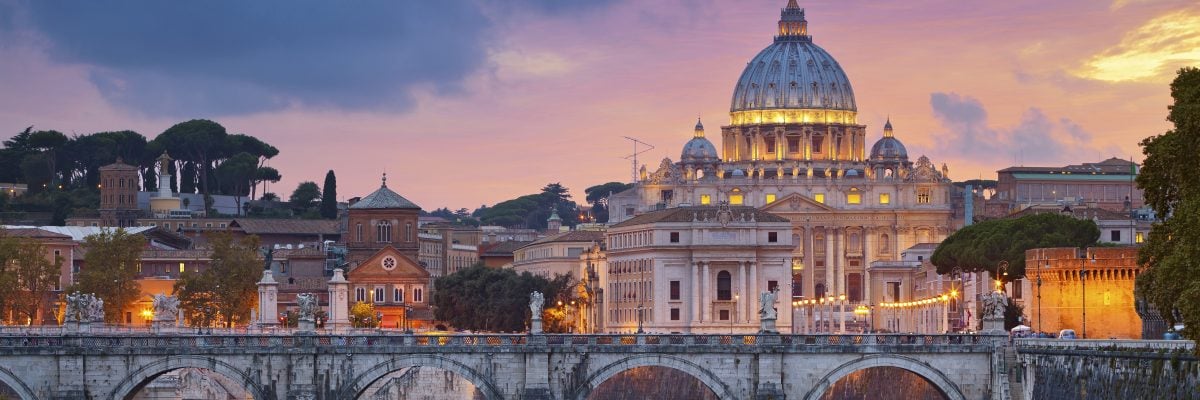Jesus said his Church would be “the light of the world.” He then noted that “a city set on a hill cannot be hid” (Matt. 5:14). This means his Church is a
visible organization. It must have characteristics that clearly identify it and that distinguish it from other churches. Jesus promised, “I will build my Church and the gates of hell will not prevail against it” (Matt. 16:18). This means that his Church will never be destroyed and will never fall away from him. His Church will survive until his return.
Among the Christian churches, only the Catholic Church has existed since the time of Jesus. Every other Christian church is an offshoot of the Catholic Church. The
Eastern Orthodox churches broke away from unity with the pope in 1054. The Protestant churches were established during the Reformation, which began in 1517. (Most of today’s Protestant churches are actually offshoots of the original Protestant offshoots.)
Only the Catholic Church existed in the tenth century, in the fifth century, and in the first century, faithfully teaching the doctrines given by Christ to the apostles, omitting nothing. The line of popes can be traced back, in
unbroken succession, to Peter himself. This is unequaled by any institution in history.
Even the oldest government is new compared to the papacy, and the churches that send out door-to-door missionaries are young compared to the Catholic Church. Many of these churches began as recently as the nineteenth or twentieth centuries. Some even began during your own lifetime. None of them can claim to be the Church Jesus established.
The Catholic Church has existed for nearly 2,000 years, despite constant opposition from the world. This is testimony to the Church’s divine origin. It must be more than a merely human organization, especially considering that its human members— even some of its leaders—have been unwise, corrupt, or prone to heresy.
Any merely human organization with such members would have collapsed early on. The Catholic Church is today the most vigorous church in the world (and the largest, with a billion members: one sixth of the human race), and that is testimony not to the cleverness of the Church’s leaders, but to the protection of the Holy Spirit.
FOUR MARKS OF THE TRUE CHURCH
If we wish to locate the Church founded by Jesus, we need to locate the one that has the four chief marks or qualities of his Church. The Church we seek must be one, holy, catholic, and apostolic.
The Church Is One (Rom. 12:5, 1 Cor. 10:17, 12:13, CCC 813–822)
Jesus established only
one Church, not a collection of differing churches (Lutheran, Baptist, Anglican, and so on). The Bible says the Church is the bride of Christ (Eph. 5:23–32). Jesus can have but
one spouse, and his spouse is the Catholic Church.
His Church also teaches just one set of doctrines, which must be the same as those taught by the apostles (Jude 3). This is the unity of belief to which Scripture calls us (Phil. 1:27, 2:2).
Although some Catholics dissent from officially-taught doctrines, the Church’s official teachers—the pope and the bishops united with him—have never changed any doctrine. Over the centuries, as doctrines are examined more fully, the Church comes to understand them more deeply (John 16:12–13), but it never understands them to mean the opposite of what they once meant.
The Church Is Holy (Eph. 5:25–27, Rev. 19:7–8, CCC 823–829)
By his grace Jesus makes the Church holy, just as he is holy. This doesn’t mean that each member is always holy. Jesus said there would be both good and bad members in the Church (John 6:70), and not all the members would go to heaven (Matt. 7:21–23).
But the Church itself is holy because it is the source of holiness and is the guardian of the special means of grace Jesus established, the sacraments (cf. Eph. 5:26).
The Church Is Catholic (Matt. 28:19–20, Rev. 5:9–10, CCC 830–856)
Jesus’ Church is called catholic (
“universal” in Greek) because it is his gift to all people. He told his apostles to go throughout the world and make disciples of “all nations” (Matt. 28:19–20).
For 2,000 years the Catholic Church has carried out this mission, preaching the good news that Christ died for all men and that he wants all of us to be members of his universal family (Gal. 3:28).
Nowadays the Catholic Church is found in every country of the world and is still sending out missionaries to “make disciples of all nations” (Matt. 28:19).
The Church Jesus established was known by its most common title, “the Catholic Church,” at least as early as the year 107, when Ignatius of Antioch used that title to describe the one Church Jesus founded. The title apparently was old in Ignatius’s time, which means it probably went all the way back to the time of the apostles.
The Church Is Apostolic (Eph. 2:19–20, CCC 857–865)
The Church Jesus founded is apostolic because he appointed the apostles to be the first leaders of the Church, and their successors were to be its future leaders. The apostles were the first bishops, and, since the first century, there has been an unbroken line of Catholic bishops faithfully handing on what the apostles taught the first Christians in Scripture and oral Tradition (2 Tim. 2:2).
These beliefs include the bodily Resurrection of Jesus, the
Real Presence of Jesus in the Eucharist, the
sacrificial nature of the Mass, the
forgiveness of sins through a priest,
baptismal regeneration, the existence of
purgatory, Mary’s
special role, and much more —even the doctrine of apostolic succession itself.
Early Christian writings prove the first Christians were thoroughly Catholic in belief and practice and looked to the successors of the apostles as their leaders. What these first Christians believed is still believed by the Catholic Church. No other Church can make that claim.
Pillar of Fire, Pillar of Truth
Man’s ingenuity cannot account for this. The Church has remained one, holy, catholic, and apostolic—not through man’s effort, but because God preserves the Church he established (Matt. 16:18, 28:20).
He guided the Israelites on their escape from Egypt by giving them a pillar of fire to light their way across the dark wilderness (Exod. 13:21). Today he guides us through his Catholic Church.
The
Bible, sacred
Tradition, and the writings of the
earliest Christians testify that the Church teaches with Jesus’ authority. In this age of countless competing religions, each clamoring for attention, one voice rises above the din: the Catholic Church, which the Bible calls “the pillar and foundation of truth” (1 Tim. 3:15).
Jesus assured the apostles and their successors, the popes and the bishops, “He who listens to you listens to me, and he who rejects you rejects me” (Luke 10:16). Jesus promised to guide his Church into all truth (John 16:12–13). We can have confidence that his Church teaches only the truth.
Why am I here? Who made me? What must I believe? All these can be answered if only you will open yourself to God’s grace and the Church he established.

www.catholic.com


